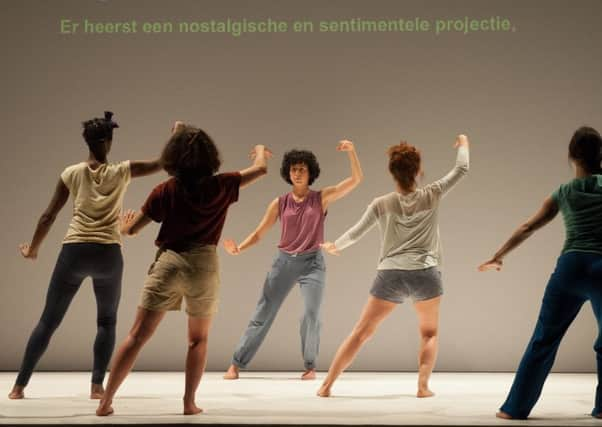Preview: Joyce McMillan looks forward to Glasgow's Take Me Somewhere festival


Twenty years on from its last edition, Glasgow still misses its legendary Mayfest, the great international festival of popular theatre and music that ran from 1983 to 1997, briefly becoming the UK’s second largest arts festival after Edinburgh, and helping to transform both the city itself and its international image.
The spirit of Mayfest has never really died, though; and now it’s about to burst back into life with the opening of Take Me Somewhere, the new celebratory festival of contemporary performance set to take place in venues across the city for three weeks from 22 February, and masterminded by Jackie Wylie, who is not only former artistic director of the Arches – suddenly closed after the loss of its late-night licence in 2015 – but artistic director-in-waiting of the National Theatre of Scotland, where she takes up her new role in March.
Advertisement
Hide AdFor now, though, she is fiercely focused on the new festival, which she hopes will continue – with a new artistic director – well into the future. And it’s typical of Wylie’s work, at the Arches and elsewhere, that although the festival can’t afford to host a large programme of international work, she has programmed two major shows from beyond the UK which are not only exceptionally powerful and resonant in themselves, but which clearly connect with the new or recent work by Scottish and other UK artists that makes up the rest of the programme.
“For me, this is all about enabling people in Scotland to see great international work, and also making sure that artists based here have the chance to see their work in an international context,” she says. “In my experience, artists love having real opportunities for international exchange and comparison; so for the opening of the festival, I’ve invited this wonderful Spanish group called El Conde de Torrefiel, with their show Guerrilla. This show has already been in major European cities like Athens, Berlin and Dublin; and I think the reason it is so powerful is that in each city it visits, it takes a group of people from that city, all under 40, and simply invites them to talk about their deepest feelings about the time we’re living in. And obviously, since this show was launched last year, those times have only become more stressful and surreal.”
“The company will be here for three weeks, working with the people who will take part in the performances at the Tramway; and so it’s also a show that – like The Suppliant Women at the Lyceum – asks some big current questions about the boundary between the performers, and the audience. Then the second half of the show is a kind of apocalyptic club night at the end of the world, so I hope at least part of the audience will be ex-clubbers from the Arches!
“I think it speaks to the feeling many people have that we’re all still going about our everyday lives, here in the West, while underneath us the things that make that life possible are just shifting and giving way. So there are clearly parallels with shows like Kieran Hurley’s Heads Up and Julia Taudevin’s Blow Off, seen on the Fringe last year, which also face up to this looming sense of apocalypse, and to the Glasgow artist Lucy Gaizely’s piece 21CC, made with her son Raedie, which plays alongside Guerrilla at the Tramway; that’s about a mother trying to bring up a son in an age of meltdown, and how these times relate to ideas about manhood and masculinity.”
The idea of masculinity, and how we define it, also looms large in Take Me Somwhere’s second international show, #negrophobia, created by United States performer and theatre-maker Jaamil Olawale Kosoko. Described as a “performance lecture and ritual seance”, Kosoko’s work explores the American fascination with, and fear of, the black male body; and Wylie believes it is a highly significant show at this moment.
“Obviously, the issue of how America views black people has been very prominent in the news over the last couple of years, in the Black Lives Matter campaign and elsewhere. But this show also explores themes to do with gender and body image that are very much present in some of the British-based work in our programme – in Nando Messias’s Shoot The Sissy, for instance, based on his experience of being attacked in the street when he was living in Brazil, or in Lucy McCormick’s Fringe hit Triple Threat, a trashstep-dubpunk re-enactment of the New Testament.”
Advertisement
Hide AdThose two strands reflect only part of the festival which will spread across Glasgow, from venues like the Platform at Easterhouse – where three Glasgow experimental bands will be exploring their relationship with theatre and performance – to the Citizens’ Theatre, the School of Art, and the Glue Factory at Speirs Wharf. There will also be a focus on the work and thinking of the late Glasgow-based performance artist Adrian Howells, whose emphasis on kindness, care and love as key elements in the creative process seems, says Wylie, particularly important at the moment.
“These are complicated, difficult times in so many ways,” she says, as she prepares to take her ideas and energy on to the National Theatre of Scotland. “So my hope is that we can do as much as possible to ensure that whatever happens, artists will still have the confidence to keep looking outwards towards the horizon, embracing what comes to us from across the world, and heading out there themselves. It’s one of the main aims of Take Me Somewhere to play a part in that; and I hope it will be able to continue that work, even after I’ve moved on.” ■
Take Me Somewhere, various venues, Glasgow, 22 February until 11 March, www.takemesomewhere.co.uk